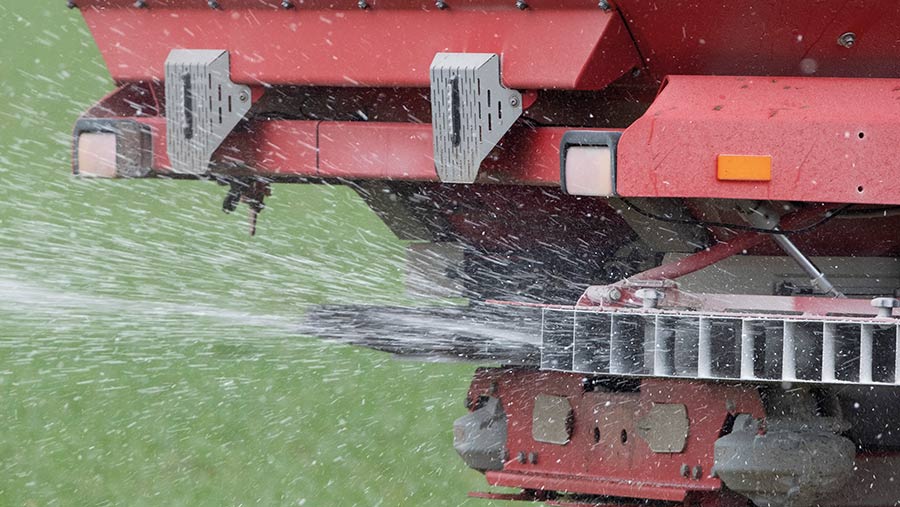Global supply constraints push up UK fertiliser prices
 © Tim Scrivener
© Tim Scrivener Fertiliser markets have started to ramp up in recent weeks, with rising oil and natural gas prices and tighter global supplies providing support.
Imported ammonium nitrate stood at £362/t in August, an increase of £18/t on the previous month, but still less than half of where prices were this time last year.
Granular urea has made similar gains and was up £20/t on the month to average £417/t, according to AHDB figures.
See also: Red diesel pushed up above 80p/litre by high oil prices
Natural gas accounts for a high proportion of the total production cost for fertiliser. The UK natural gas price increased during August and, despite falling back slightly in early September, remains above July levels, trading at 87.5p/therm on 18 September.
Further pressure has been added by rising Brent crude oil prices, which have increased by 25% in the past three months and stood at US$95.28 (£76.98) a barrel on 19 September.
Reduced export volumes of fertiliser products from China and less production in the EU is also restricting availability.
The numbers
£362/t
Ammonium nitrate (August 2023, AHDB)
87.5p/therm
UK natural gas price on 18 September.
25%
Increase in Brent crude oil prices during past three months
Tight supply
Rob Buck, national sales manager at fertiliser specialist Nitrasol, said supply-wise it’s quite tight globally at the moment, which is the main reason for the uptick in pricing.
“In Europe we have seen production cut in Belgium, some plants that still haven’t restarted and additional Russian factors adding fuel to the fire,” said Mr Buck.
Prices still remain well below where they were this time last year, but are starting to look more bullish, with CF Fertilisers still withdrawn from the market and a heavy reliance on imported products.
Josh Joachim, fertiliser procurement manager at AF Group, said: “While gas prices are way back from where they were this time last year, they are still very high compared with where they have been. So, there are still quite a lot of sites that are either offline or at reduced capacity.
“Pre-war, you would have had Russian product moving from Russia to eastern Europe, and then eastern European product that’s good quality would come to western Europe. But with the sanctions still in place, that is not happening.”
Mr Joachim added that China had announced it would not be exporting as much fertiliser and instead keep more of it for domestic production.
UK market
Looking forward, growers are looking for a potato fertiliser for next year, now that they have got cropping plans a bit more in place, said Mr Joachim.
“There are a lot of farmers who haven’t put any phosphorus (P) and potassium (K) on in the past two years, and there’s only so many times you can do that before you start depleting your soil stocks and seeing a yield deficit,” he added.
“We’ve seen a lot more increase in P and K sales this year, and in the past eight weeks we’ve probably sold more than in the previous 18 months.”
However, some traders said the UK has still got plenty of stock at the moment.
One trader told Farmers Weekly: “Until farmers come back to the market, I can’t see the UK market ticking up any higher.”
Another trader said it’s been extremely quiet for orders. However, that can all change extremely quickly and an increase in the grain price might bring a few more orders through in the coming weeks.
